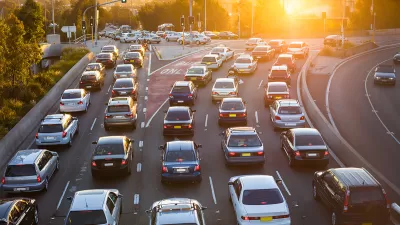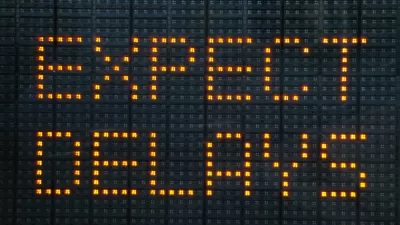The Texas Transportation Institute's latest Urban Mobility Scorecard claims, that "TRAFFIC GRIDLOCK SETS NEW RECORDS FOR TRAVELER MISERY." This critique by the Frontier Group puts their hyperbole into perspective. No need to panic!
Tony Dutzik writes a response to the release this week of the Texas Transportation Institute's (TTI) latest Urban Mobility Scorecard, "a national estimate of the intensity and costs of highway congestion."
According to Dutzik, "[t]he Urban Mobility Scorecard has become something of a piñata among smart transportation analysts, and for good reason. It ranks as 'worst' for congestion many of the densely urbanized cities whose residents are least exposed to traffic, due to the prevalence of transit and the shorter length of automobile trips. It exaggerates the economic impact of congestion, as laughably demonstrated by City Observatory's 'Cappuccino Congestion Index.' And previous editions have suffered from methodological flaws. Joe Cortright's post at City Observatory is a great one-stop shop for the main critiques."
Moreover, "[t]aking TTI's findings at face value, this year is no exception. Driving is on the increase (though likely more as a result of crashing oil prices than economic growth). And TTI’s figures show that congestion did get worse in most cities last year compared with 2013."
Later int he article, Dutzik points out the Frontier Group's "fundamental issue" with TTI's approach to congestion: context. "The $160 billion 'price tag' for congestion estimated by TTI is a big number, but it pales in comparison with other costs of automobility, including the $836 billion in economic losses and societal harm caused by motor vehicle crashes each year, the $411 billion households spend on cars annually and $328 billion we spend on fuel to run them[1] -- much less the costs imposed by air pollution and transportation’s contribution to global warming. Congestion is just one of many problems caused by our car-dependent transportation system, and not always the most important or the most costly one. The best responses to it are likely to be solutions that address many of the costs and dangers of transportation all at once."
FULL STORY: News Flash: Congestion Still Not Getting (Much) Worse

Alabama: Trump Terminates Settlements for Black Communities Harmed By Raw Sewage
Trump deemed the landmark civil rights agreement “illegal DEI and environmental justice policy.”

Study: Maui’s Plan to Convert Vacation Rentals to Long-Term Housing Could Cause Nearly $1 Billion Economic Loss
The plan would reduce visitor accommodation by 25% resulting in 1,900 jobs lost.

Planetizen Federal Action Tracker
A weekly monitor of how Trump’s orders and actions are impacting planners and planning in America.

Waymo Gets Permission to Map SF’s Market Street
If allowed to operate on the traffic-restricted street, Waymo’s autonomous taxis would have a leg up over ride-hailing competitors — and counter the city’s efforts to grow bike and pedestrian on the thoroughfare.

Parklet Symposium Highlights the Success of Shared Spaces
Parklets got a boost during the Covid-19 pandemic, when the concept was translated to outdoor dining programs that offered restaurants a lifeline during the shutdown.

Federal Homelessness Agency Places Entire Staff on Leave
The U.S. Interagency Council on Homelessness is the only federal agency dedicated to preventing and ending homelessness.
Urban Design for Planners 1: Software Tools
This six-course series explores essential urban design concepts using open source software and equips planners with the tools they need to participate fully in the urban design process.
Planning for Universal Design
Learn the tools for implementing Universal Design in planning regulations.
Caltrans
Smith Gee Studio
Institute for Housing and Urban Development Studies (IHS)
City of Grandview
Harvard GSD Executive Education
Toledo-Lucas County Plan Commissions
Salt Lake City
NYU Wagner Graduate School of Public Service




























